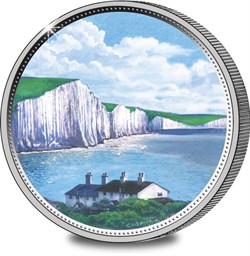-no-button.jpg)
 |
Location: Dover
Date completed: c. 70 Million BC
Function: Natural Feature
|
Think of Britain - and what comes to mind? It could be Big Ben,
Buckingham Palace, or your home town - but most likely it would be
the White Cliffs of Dover. Before the age of the Jumbo Jet they
were the first and last of England that the traveller would see, a
highly visible, utterly memorable reminder of home. They face
Europe across the narrowest part of the English Channel, a natural
route for invaders and migrants since Britain was parted from the
continent some 8,000 years ago. However, the cliffs presented a
formidable barrier to incomers, so they would have looked for
easier landing places along the coast. In 55 BC Julius Caesar
commented of the White Cliffs that, "The place was altogether
unsuitable for landing" and so landed along the coast at Deal. The
Romans built lighthouses, or Pharos, on the cliffs to aid
navigation - one of them can be seen today in Dover Castle. In
fact, the cliff tops have been fortified since the Iron Age. The
Castle dates back to the 11th century, but so strategically vital
is its position that it has been almost continuously modernised and
fortified right up to World War II. Winston Churchill used rooms in
the lower levels as his headquarters during the Battle of
Britain.
The White Cliffs were formed around 70 million years ago, when
Britain was covered by sea. They are made up of the skeletons of
trillions of tiny algae (coccoliths) deposited at the rate of half
a millimetre per year to form the white mud and then chalk which
makes up the cliffs. Today the cliffs are a popular beauty spot -
the area of the South Downs of which they are part has been
designated an area of outstanding natural beauty. In 1999 The
Gateway, a sustainable National Trust resource for visitors, was
built. It provides information on local history, archaeology and
landscape, as well as a restaurant.
The White Cliffs have been celebrated in literature, poetry and
song, most famously in the song "There'll be bluebirds over the
White Cliffs of Dover" (although bluebirds are not, of course,
found in Britain).